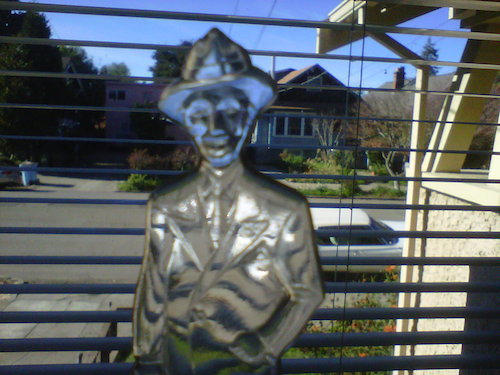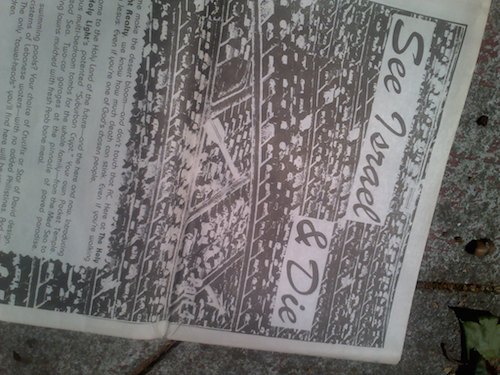See You in the Emergency Room, Part Two

Continued from Part 1.
Hobbling through Tompkins Square Park on a fine summer afternoon, I was lucky enough to cross paths with Karen Weiser. My crutches kicked off a conversation about the months and months gone by since Karen and I broke bread, and with them I knit a tale of ludicrous woe—starting with my tripping, and snapping—bien cassée—my tibia as I crumpled onto the German parking lot; my supine bordercrossing into Metz, France, where I shot the shit with a visiting doctor from Cleveland named Dr. Doctor; where the French surgeon, with the equally amazing name of Dr. Beau, set my bone while ribbing me, “Ah oui, un américain. Torturer,” (days after Abu Ghraib); and where the assistant surgeon, skimming my chart as she wheeled me into the operating room, said, “Julien Poirier—du journal New York Nights”? To be followed by five nights on my back, chasing veal dumplings and codeine lozenges with waxed cups of joo d’or ange, then back to New York—where Marisol and I promptly split up, leaving me without digs for the summer. Broke, sticky: the boatload of normal gripes from a poet stuck in the city for the dog days—which are of course the most fantastic days of the year there: the only place I’ve ever felt nostalgia for the moment is in New York in the summer. So on the outside, everything with me was crummy, but I had a gooey center. I was sleeping on Filip Marinovich’s floor in Tudor City, within spitting distance of the U.N.—and sometimes calling myself a poet feels like nothing but a ploy to hang out with Filip till sunrise. I spent evenings making out on park benches with my future wife, or losing pierogi-eating contests to her in Odessa (on the dark, rightbrain side of the diner)—and I got to read my new poems at some hole-in-the-wall in Park Slope, and see that part of town before funny money bought its hip replacement, to Elizabeth Reddin and Chris Martin. A balmy 5th Street with nothing much afoot. And what better audience?
Well, said Karen—that doesn’t seem half bad. But if, as you say, you’re out of a place—why not housesit for me and Anselm while we run around Italy for a week? This is perfect! The only thing is—the most important thing, actually—I have a bird. A very particular little bird by the name of Pig, and he doesn’t necessarily like strange men too much. Especially skinny men on crutches. Better that we arrange a meeting...
Pig was a pugnacious green parakeet. A featherweight. And though he bit my thumb “to the quick” and made it bleed, he also ducked into the short sleeve of my shirt and nuzzled my collarbone with his flinty schnozz. Karen declared us soul mates on the spot and gave me the key to the city—the city of C Magazines on hers and Anselm Berrigan’s bookshelf. I loved the little wingnut. He stood on the corner of my bowl and shared my rice krispies. He laughed out loud at Zoolander with me (note to future biographers: Anselm and Karen owned it on DVD) and danced with me (for me) to the Buzzcocks on heavy rotation. Matvei Yankelevich’s micro-chap My Gender is in My Pants was face-out on the shelf. I felt right at home.
The one place I didn’t take Pig was up onto the roof. I would go up there with Kailey, aforementioned future wife, and survey the East Village. The rooftop was like a scorching dead flowerbed in Babylon. You could smell popcorn shrimp from Two Boots, whose mini-marquee was still advertising midnight showings of Donnie Darko.
It seems especially unreal that an assistant surgeon in Metz (where Napoleon III and his army repaired during the Paris Commune) would’ve known my name from New York Nights, since, when we threw a birthday bash for the newspaper at the Bowery Poetry Club—our rag’s maternity ward, in other words—no one showed up. Actually, the only person who showed up and wasn’t an editor was Karen Weiser. And thinking back, now, I remember bumping into Karen a couple of months after my grandma died in Berkeley, and how when I told her the news, although I was all breezy about it, she recoiled with real physical empathy. And I remember, too, standing on the roof after meeting Pig—and she and I talking about how we should hang out more together. Become actual friends.
That never happened, though, and I suspect that the reason is traceable to the newspaper I can’t shut up about. New York Nights. My fucking albatross, if you haven’t noticed. Or, if you want to put it another way: the reason Karen and I never became better friends is because if politics is a mental illness, I’m sick in the head. It’s because Israel bombed Lebanon in 2006 and I sprang fangs and published a nasty piece in the paper.

Now, Karen never told me that she was offended by this—we never talked about it at all. And the only reason I think she might have been is because, some years earlier, she’d told me a story about going to a poetry reading by a well-known poet who read a fiery poem comparing the Palestinians to the Native Americans. An analogous genocide, in this poet’s eyes. And Karen saw that line of reasoning as a line of bullshit, and I think she was right. She was heartsick at the disaster in Israel-Palestine. She didn’t intend to let poets get away with painting phony targets on it—any more than she’d let politicians canter on about “the Palestinian problem” or blooming deserts. Of course, this is only how I see it: how I see the way Karen might have seen it, based on how I saw her.
But I think Karen lost trust for me after I ran that piece. If so, she was in good company. I remember having brunch with Steve Dalachinsky and Yuko Otomo right after I released the issue. I remember Steve telling me that for years he’d condemned Israel but this time, as a Jew, he wasn’t able to condemn its bombing of Hezbollah in Lebanon. For whatever that condemnation would’ve been worth, anyway. For whatever my own bile was worth. Steve told me I’d already got on the wrong side many poets in New York, and now I was going to annoy whoever was left. It’s important that you understand that he told me this with love and real respect. He told me that he had been talking to his friend Tuli Kupferberg, and that Tuli, too, couldn’t fault Israel this time. Could that be true? Tuli, who every two weeks sent a fat envelope with no return address to the New York Nights PO Box, full of his cartoons, para-songs, and send-ups of military jargon? Tuli, whose eyes sparked mischief as he praised our paper when I’d met him at the Project a year earlier? Tuli, who looked like the match to Dumbledore that got lost behind the dryer?
If he couldn’t condemn Israel this time, where did that leave me?
I guess it left me with black-magic satire, or whatever you would call this kind of attack on my internally divided allies. Pointless, maybe. And a poor stand-in for a poem. Not a poem that “condemns Israel’s actions” but a poem whose choice words on pretty, venomous frogs makes those actions obsolete. A poem that uncovers the true Israel in our Holocene hearts, the hanging gardens of Babylon in our blood, and the “Christmas on earth” that Rimbaud mentioned before he did Rambo. At the time, rage was all I could do—and who can do more than what they can do? Maybe it was all I was good for. And that would say something about my character, of course.
Julien Poirier grew up in the San Francisco Bay area and was educated at Columbia University. He is ...
Read Full Biography

